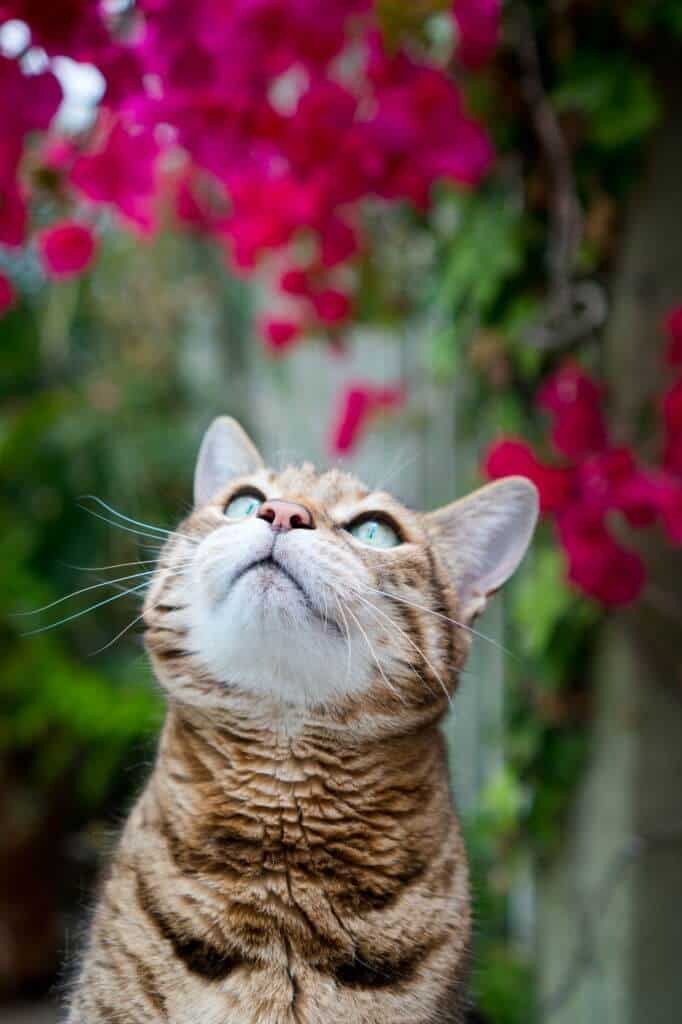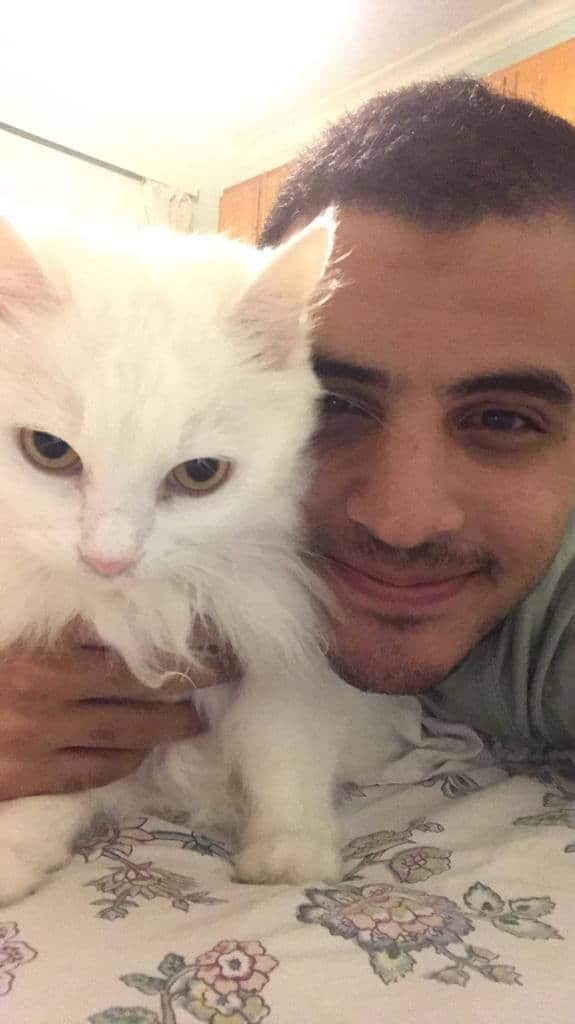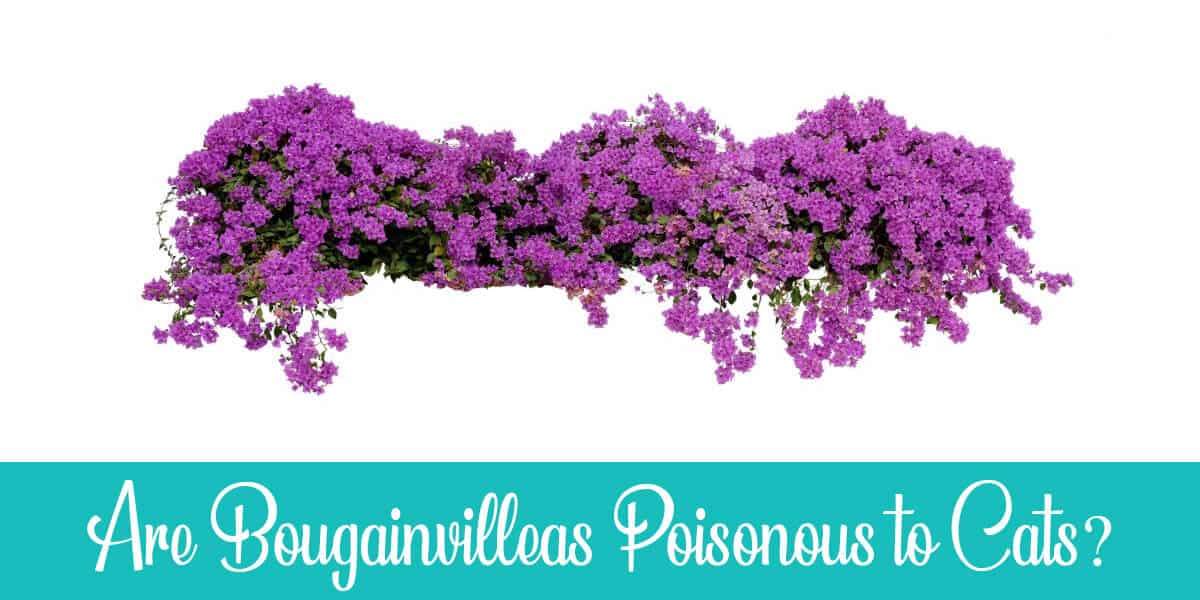Bougainvillea is a colorful woody vine that was named after Louis Antoine de Bougainville, a Frenchman who sailed the world in 1767.
The plant is mostly evergreen and semi-evergreen in colder areas. It can grow to great heights and crawl around whatever is adjacent.
It has beautiful heart-shaped green leaves and small yellowy-white flowers that aren’t impressive looking. However, the papery bracts surrounding these flowers are responsible for the beautiful colors of this plant.
Because many love growing bougainvilleas in their gardens and houses, we created a post that answers every cat owner’s common question “are bougainvilleas poisonous to cats?”
Table of Contents
Are Bougainvilleas Poisonous or Toxic to Cats?
The Bougainvillea plant isn’t included in the ASPCA Animal Poison Control Center’s list of toxic and non-toxic plants for cats. It’s considered safe for cats and ingesting it doesn’t cause serious problems.
However, skin and mouth irritation are possible symptoms and its thorns are dangerous to pets and humans.
Toxicity of Bougainvillea
Bougainvillea isn’t classified as a toxic plant. Many people like to use it as a decorative plant. Some precautions need to be taken when dealing with bougainvillea, though.
The plant isn’t edible. There might not be any problem if a small amount is eaten, but it’s recommended neither for pets nor humans to eat the leaves or berries of this plant.
This is because the sap in the leaves and berries of bougainvillea can cause oral irritation for humans and pets. And if the sap is consumed in large quantities it can cause illness.
The same goes for its thorns. Bougainvillea’s thorns are sharp and one prick from it causes an allergic reaction that might lead to dermatitis.
Related:
– Are gladiolus toxic to cats?
– Are marigolds safe for cats?
Bougainvillea’s Effect on Cats
Although the bougainvillea plant isn’t edible, if your cat eats one leaf or two, there wouldn’t be any problem. But if she eats more, she might vomit and experience mild stomach upsets, which is what usually happens when a cat eats too much of a plant.
The problem lies in the sap of the bougainvillea plant. Bougainvillea’s sap is mildly toxic and causes oral irritation. This results in excessive salivation and nausea in cats.
If a cat consumes large quantities of bougainvillea’s sap, she may experience gastrointestinal symptoms, including vomiting and diarrhea.
Another reason why you should be careful with bougainvillea in your house as a cat owner is its thorns. If your cat comes near a bougainvillea plant, there’s a big chance she’ll get pricked by its thorns.
The scratch of a bougainvillea’s thorn can cause severe cuts to a cat’s skin. This can cause pain, itching, and irritation, which isn’t comfortable for cats.
Note also that bougainvillea’s blossoms attract butterflies and bees, which runs the risk of your feline getting stung by a bee. To add, bougainvillea is one of the plants that are usually treated with pesticides.
It’s dangerous for cats to eat pesticide-treated plants, so make sure to get your cat away from your plants if you treat them with pesticides.
What to Do If Your Cat Eats or Touches Bougainvillea?

If your cat eats a couple of petals, you shouldn’t be worried; they’re not poisonous to cats. However, she might vomit as a reaction to eating something foreign to her body.
When she eats too much of the petals, it’s best to take her to the vet to deal with the symptoms as she might experience stomach issues.
Also, watch out for any oral irritation, especially if she eats the plant’s berries or leaves. The sap in the berries and leaves of bougainvillea is irritating for the skin and mouth of cats.
In this case, you should remove any parts of the plant in your cat’s mouth or fur and give her a wash with warm water and gentle soap.
This is also recommended in case your cat got scratched by the plant’s thorns. You can reduce skin irritation and swelling using cold compresses.
However, if you notice that your cat is experiencing severe symptoms, don’t hesitate to call your vet immediately to ensure your cat’s safety.
Be careful, pregnant or lactating cats shouldn’t eat or get in contact with bougainvillea plants.
Related:
– Are Bromeliads Safe for Cats?
– Can Lisianthus Harm My Cat?
– Are Freesias poisonous to cats?
How to Prevent Your Cat From Eating Bougainvillea
Here are some tips on keeping your cat safe from bougainvillea flowers:
Keep the Plant Away From Your Cat
The best way to keep your cat away from bougainvillea is to avoid placing it in an area where your kids or pets have access to it. So don’t plant it in places like the playground, walk paths, and inside the house.
Instead, you can grow it in tall pots and place it away from your kids’ and cats’ reach. Growing it in front of the house on the roadside is another option.
Also, growing bougainvillea in a protective planting bed will keep your kids and cats away from it so you can enjoy the beauty of this plant without any worries.
Deter Your Cat Away From the Plant
Cats are sensitive to smell and you can use that to keep your cat away from your favorite plants. The citrus smell is something that cats can’t handle. So, throw a lemon slice or peel in your plant’s soil.
Cayenne pepper can be used for the same purpose. Sprinkle some around the plant’s pot or bed and this should deter your cat from getting anywhere near your plant.
You can also use cat repellent like the Green Gobbler All Natural Orange Oil Concentrate. Dilute it with water and put it in a spray bottle.
Spray it around the plant, not on its leaves. This should do the job of keeping your cat away from your bougainvillea plant.
Make sure to reapply every few days, for at least two weeks to give your cat time to get trained not to get close to the sprayed area.
To Sum Up
Bougainvillea is among the plants that are safe for cats, and if ingested by mistake, it doesn’t cause any serious problems. However, its sap and thorns can cause oral and skin irritation that can be easily treated.

I’ve been living with cats since 2008 and I can confidently say I have more feline friends than humans lol. I currently live with 5 cats in different life stages; two of them are less than one year old, one is 2-ish years old and the oldest two are 9-ish years old. I’ve developed a strong bond with cats over the years and I’m eager to share my experience through this blog. You can learn more about my cats here.


